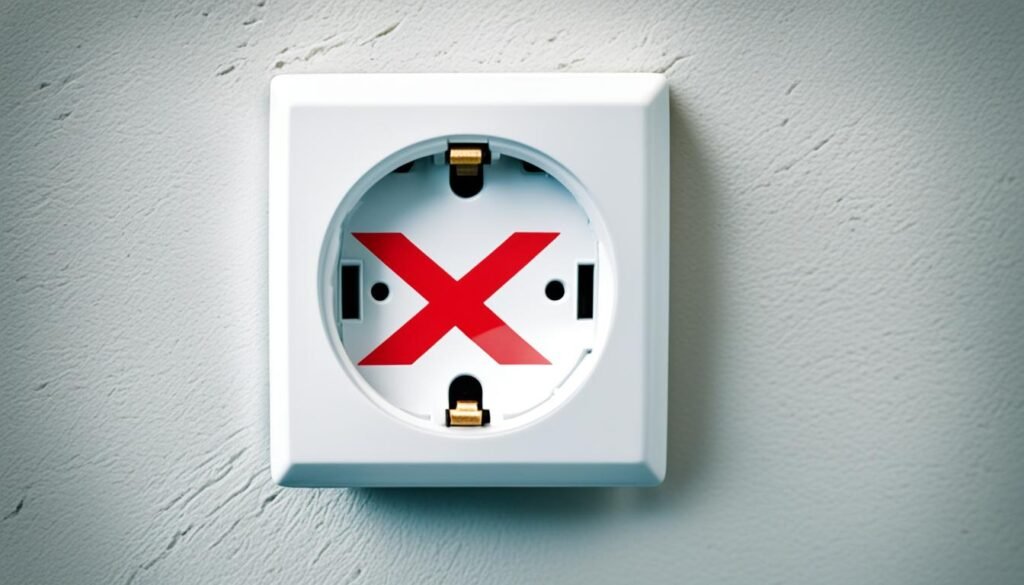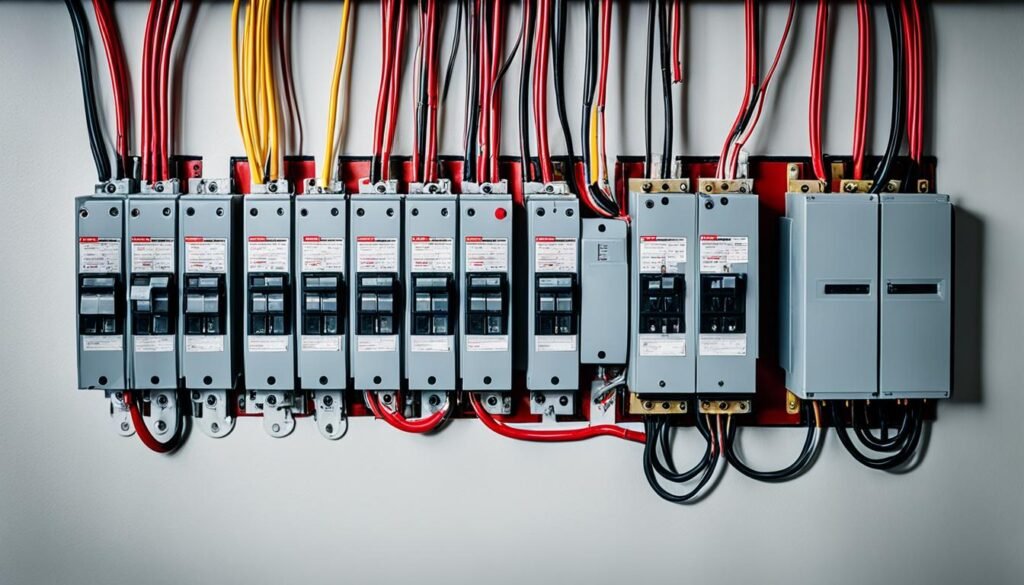Being a landlord means you have to keep your rental property’s electricity safe. It’s a legal must and the right thing to do. The Electrical Safety Standards in the Private Rented Sector (England) Regulations 2020 say all rented homes in England must have electrical safety inspections. These check-ups need to happen every 5 years, and they provide an Electrical Installation Condition Report (EICR).
Following these rules helps landlords avoid big fines and keep their tenants safe. If the EICR certificate confirms the home’s electricity is up to standard, everyone is happy. Yet, if the EICR finds any issues, landlords must fix them in 28 days. They also need to give a copy of the EICR report to the tenants.
This article will explain the Electrical Safety Standards, what EICR inspections involve, and what landlords must do to keep their rental properties safe. It’s important for anyone renting out homes, whether starting or having done it for a while. Understanding the EICR regulations and why electrical safety inspections matter helps keep your place safe and legal.
Understanding the Importance of Electrical Safety in Rental Properties
Ensuring electrical safety in rental homes is crucial. Landlords must follow fire safety laws. This means making sure all electrical parts are safe and checked often. It is vital to prevent dangers like electric shocks and fires for the tenants’ safety.
It’s key to do regular checks on the electrics. This includes both fixed wiring and portable appliances. Fixed wire testing checks the main electrical systems like wiring, plugs, and lights. They must meet certain safety levels. Portable appliance testing (PAT) makes sure objects like kettles and vacuums provided by the landlord are safe.
Landlords also need an Electrical Installation Condition Report (EICR) every five years. This gives a full look at the property’s electrical safety. The report shows the property follows safety rules and should be shown to tenants if they ask.
“Landlords have a duty to keep tenants safe from electric risks. Regular checks and maintenance create a safe home. It offers peace of mind to tenants.”
– John Smith, Electrical Safety Expert
But it’s not just about electricity. Landlords have more duties to keep their properties safe and liveable. This includes gas and energy checks, smoke alarms, and repairs.
- Conducting regular gas safety checks
- Ensuring the property has a valid Energy Performance Certificate (EPC)
- Installing and maintaining smoke alarms and carbon monoxide detectors
- Keeping the property in a good state of repair
| Safety Check | Frequency | Legal Requirement |
|---|---|---|
| Electrical Installation Condition Report (EICR) | Every 5 years | Yes |
| Portable Appliance Testing (PAT) | Recommended annually | No, but recommended |
| Gas Safety Check | Every 12 months | Yes |
| Energy Performance Certificate (EPC) | Every 10 years | Yes |
Keeping up with these checks and laws is key for landlords. It means they are looking after the property and the tenants properly. It also helps protect landlords from legal troubles and bad reputation.
Overview of the Electrical Safety Standards in the Private Rented Sector (England) Regulations 2020
In June 2020, new rules changed how landlords need to care for their rental homes in England. These rules improve the safety of electrical systems. They make sure tenants are safer in places they rent throughout England.
Key requirements for landlords
Landlords must now have the electrical systems in their rental properties checked every five years. This check must be done by someone who is trained and right for the job. They then get a report that explains if the systems are safe and if any fixes are needed.
After the check, landlords should give tenants a copy of this report within 28 days. They should also show it to the council if asked. If the report says fixes are needed, these must be done within 28 days. This is to make sure the homes meet the new safety rules.
Compliance deadlines for new and existing tenancies
Old and new rental contracts have different times for when these new rules must be followed. For new homes rented after July 2020, these rules must be followed right away. But for homes already rented by then, landlords have until April 1, 2021, to catch up with these rules.
This extra time for homes already rented gives landlords a chance to get the safety checks and needed fixes done slowly. By meeting these deadlines, landlords make their rented homes safer for tenants. This also helps them avoid getting in trouble for not following the new rules.
Scope of the Electrical Safety Regulations
The Electrical Safety Standards aim to protect tenants in England’s private rented properties. This means any rental property where the tenant pays rent and considers it their main home. This includes common tenancy types like assured shorthold tenancies. But if a tenant doesn’t have full possession, the rules still apply.
They also cover Houses in Multiple Occupation (HMOs). These are homes where three or more people not from the same family live, sharing a kitchen or bathroom. HMOs with five or more tenants need to meet more fire safety and other rules.
Exceptions to the regulations
However, there are some places that the rules don’t cover. These include:
- Social housing
- Long leases of 7 years or more
- Student halls of residence
- Hostels and refuges
- Care homes, hospitals, and hospices
In these cases, landlords must still keep the place safe regarding electricity. They might need to follow different rules, specific to their type of building.
Landlords must know what rules apply to their rentals. This is key to keeping the place safe and following the Electrical Safety Regulations.
| Rental Property Type | Covered by Electrical Safety Regulations? |
|---|---|
| Assured shorthold tenancies | Yes |
| Licences to occupy | Yes |
| Houses in multiple occupation (HMOs) | Yes, with additional requirements for HMOs with 5+ tenants |
| Social housing | No |
| Long leases (7+ years) | No |
| Student halls of residence | No |
| Hostels and refuges | No |
| Care homes, hospitals, and hospices | No |
Electrical Safety Inspections (installations and appliances) for UK Rental
Electrical safety inspections are key to looking after tenants and making sure rental homes in the UK are safe. They check both the permanent electrical systems and the appliances. This gives a full view of how safe the property is.
The check looks at things like wiring and light fittings. It also focuses on the fuse box and things like showers or extractors. The goal is to spot any dangers like overloaded systems, shock risks, or potential fires. It also checks for any bad electrical work.

Although, the law doesn’t say anything about checking the appliances, it’s a really good idea. Doing regular checks on things like fridges and kettles keeps them safe. Landlords should keep a record of these checks and share it with their tenants. This brings peace of mind.
Tenants must keep their appliances safe too. They should look over their things often for any wear or damage. If they see any problems, they need to tell the landlord straight away.
By doing detailed electrical safety checks and following best practices, landlords make homes safer for their tenants. They also meet their legal duties.
To sum up what we’ve covered on electrical safety inspections in UK rental homes:
- Inspections look at both the permanent systems and the everyday appliances.
- They examine things like wiring and sockets, light fixtures, and the fuse box.
- The checks are to find problems like too much load on the system or safety concerns.
- Landlords should do regular checks on the things they provide to rent.
- Tenants have to make sure their appliances are safe too.
By making electrical safety a priority and sticking to the right inspection steps, landlords can offer secure rental places. This approach also helps in building a good connection with their tenants.
Qualifications and Competence of Electrical Inspectors
Landlords must keep their rental properties safe. They should make sure properties meet the Electrical Safety Standards. For this, they hire qualified electricians to do the checks. It’s key to pick the right inspector for accurate and trustworthy reports about the property’s electrical safety.
Choosing a qualified and competent inspector
Landlords should look at a few things when choosing an electrical inspector. The industry gives advice on ensuring the inspector is good. This advice includes:
- Checking if the inspector is a member of a registered competent person scheme
- Requiring the inspector to sign a checklist certifying their competence
- Verifying that the inspector has adequate insurance coverage
- Confirming that the inspector holds qualifications covering the current Wiring Regulations and periodic inspection and testing
- Ensuring that the inspector has at least two years of relevant experience
Following these steps can help landlords trust the inspectors’ skills. It makes sure inspections on their properties are of high quality.
Electrical safety industry competent person schemes
The electrical safety sector offers schemes to help landlords pick good electricians and inspectors. These schemes judge if a professional has the right skills. Some known schemes in the UK are:
| Scheme | Description |
|---|---|
| NICEIC (National Inspection Council for Electrical Installation Contracting) | The NICEIC is a leading voluntary regulatory body for the electrical contracting industry, assessing the competence of electrical businesses and individual electricians. |
| NAPIT (National Association of Professional Inspectors and Testers) | NAPIT is a government-approved scheme operator that registers competent businesses and individuals across various trades, including the electrical sector. |
| ELECSA | ELECSA is a competent person scheme that operates under the umbrella of the Electrical Contractors’ Association (ECA), providing certification services for electrical contractors and inspectors. |
Though joining a scheme is optional, it shows that an inspector has great skills. Landlords can also use other ways to check an inspector’s qualifications. They want to make sure the inspector is right for the job.
“Electrical safety is paramount in the private rented sector, and landlords play a critical role in ensuring that their properties meet the required standards. By engaging qualified electricians and competent inspectors, landlords can protect their tenants, comply with regulations, and maintain the overall safety and quality of their rental properties.”
Emphasising the skills and knowledge of inspectors gives landlords peace of mind. They know their properties are in good and safe hands.
Standards for Electrical Installations in Rental Properties
Landlords must make sure the electrical systems in their rental places meet the 18th edition of the Wiring Regulations, or BS 7671. Following these standards is vital for keeping tenants safe. It helps prevent electric shocks and fires.
The Electrical Installation Condition Report (EICR) checks a property’s electrical systems. It finds any issues that need fixing to meet BS 7671. Landlords should do the repairs noted in the EICR to keep the place safe as per electrical safety rules.
18th edition of the Wiring Regulations (BS 7671)
The 18th edition of the Wiring Regulations updated many rules in 2019. These updates include:
- More protection against electric shock
- Better requirements for surge protection
- New rules for electric cars charging
- Tougher standards for how cables are supported
Landlords need to know these new rules. They should hire electricians who understand the 18th edition. This way, their properties can comply with the necessary standards.
Ensuring electrical installations are safe for continued use
The aim of these regulations is to keep electrical systems in rental homes safe for tenants. If the EICR doesn’t find any problems, no immediate action is necessary.
But, if the EICR does show issues, landlords must fix them quickly. They might need to:
- Find out what’s wrong
- Do repairs or replacements to meet the standard
- Update their safety papers
- Tell tenants about any work and when it’s happening
By quickly fixing any problems and following the 18th edition rules, landlords can ensure a safe home for their tenants. This also meets their legal duty for electrical safety.
The Electrical Installation Condition Report (EICR)
The Electrical Installation Condition Report (EICR) is vital for landlords. After an electrical safety check, they need this report. It shows the state of the electrical system. It also points out problems that need fixing.
Contents of the EICR
The EICR has key info about the electrical system. This includes:
- The results of the inspection and testing (satisfactory or unsatisfactory)
- A list of problems that need fixing
- The date for the next checkup
The report lists the inspector’s details. This shows it was checked by someone qualified. Their name and signature are there.
Satisfactory and Unsatisfactory EICR Outcomes
A satisfactory EICR says the electrical system is safe. It’s in good condition. No more checks are needed until later.
On the contrary, an unsatisfactory EICR means there are safety risks. It needs attention. The landlord has to get a qualified electrician to fix it within 28 days.
Supplying the EICR to Tenants and Local Authorities
Landlords must give the EICR to different people. This makes sure everyone knows the electrical system is safe:
| Recipient | Timeframe |
|---|---|
| Existing tenants | Within 28 days of the inspection |
| New tenants | Before they move in |
| Prospective tenants | Within 28 days of a request |
| Local authority | Within 7 days of a request |
There’s also a simpler version of the EICR available. It’s called the ‘Landlord Electrical Installation Safety Record.’ This makes it easier for tenants to understand.
By getting a good EICR and handling any problems fast, landlords keep their properties safe. They also follow the Electrical Safety Regulations well.
Remedial Work and Further Investigations
When an EICR shows a problem, landlords must act fast. They need to make sure their place is safe. This means getting the problems fixed or checked by a professional quickly.
Timelines for Completing Remedial Work or Further Investigations
If an EICR says work is needed, landlords can’t wait. They have to fix it within 28 days. The report might have a shorter time too.
- Remedial work should be done within 28 days or sooner if the report says so.
- After fixing the issues, the landlord needs proof from the expert. The proof must show the place is now safe, or if more work is needed.
Providing Written Confirmation of Completed Work
After the repair work, the landlord needs to do a few things:
- They must get a statement from the professional who fixed the problem. The statement should say the place is safe now or if more work is still needed.
- The tenant gets this statement and the first report within 28 days of the repair.
- Also, the problem report and the repair proof must be sent to the local council in the same 28 days. This shows the law is followed.

If the problem isn’t fixed in time, the landlord could face fines. They are responsible for keeping their tenants safe. So, they should fix any electrical issues fast.
“Looking after the electrical safety of rental homes is crucial. Landlords are legally and morally bound to do this. Quick action and proper repairs show real care for tenant safety and following the rules.”
To wrap up, landlords need to react quickly to a bad EICR. They should get the needed repairs done, get them checked, and inform everyone involved in time. This way, they make sure their rental homes are safe and meet all their legal duties.
Portable Appliance Testing (PAT) in Rental Properties
The law doesn’t insist on portable appliance testing (PAT), but it’s a good idea for landlords. They should make sure any electrical items they give their tenants are safe. PAT checks things like cookers, fridges, and TVs for dangers. This cuts the chance of electrical accidents.
To keep landlord-provided appliances safe, it’s smart for landlords to do PAT tests often. They should give tenants a record of these tests. This shows they care about electrical safety at their rental places. Remember, though, it’s up to tenants to look after their own electrical appliances.
It’s helpful for both landlords and tenants to sign up their appliances with a product safety scheme. This way, they’ll know if there are any recalls or safety warnings about their devices. This makes the rental home safer.
“Regular portable appliance testing is a proactive measure landlords can take to ensure the safety of their tenants and protect their rental properties from electrical hazards.” – Electrical Safety First
When doing PAT checks, landlords should keep in mind:
- The age and condition of the appliances
- The frequency of use and where they are used
- What the manufacturer says about testing and upkeep
- Who is doing the tests and their skills
| Appliance Type | Recommended PAT Frequency |
|---|---|
| Refrigerators and Freezers | Every 2 years |
| Washing Machines and Dishwashers | Every 2 years |
| Electric Cookers and Hobs | Every year |
| Microwaves | Every year |
| Televisions and DVD Players | Every 2-4 years |
By setting up a regular PAT testing plan and keeping good records, landlords show they take electrical safety seriously. It ensures tenants live in a safer place. Being proactive stops accidents and injuries. It also helps the rental property’s appliances last longer.
Enforcement and Penalties for Non-Compliance
In 2020, the U.K. made new laws for electrical safety in rented homes. Local authorities check if landlords follow these rules. If they find problems, they can make sure the issues are fixed.
Local Authorities’ Responsibility for Enforcement
Local authorities make sure that homes to rent are electrically safe. They check on landlords and deal with any issues found. Their aim is to keep tenants safe from dangers like faulty wiring.
Financial Penalties for Breaching Electrical Safety Duties
If landlords don’t keep their homes electrically safe, they may face big fines. These fines can reach up to £30,000. Such penalties motivate landlords to ensure their properties are safe for tenants.
When an issue is found, a local authority may order the landlord to fix it by a certain date. If the landlord doesn’t act, the authority can take matters into their own hands to protect the tenants.
In cases where a landlord ignores a remedial notice, the local authority has the power to arrange for the necessary work to be carried out themselves. This can be done with the tenant’s consent, and the costs incurred can be recovered from the landlord. This provision ensures that essential electrical safety work is completed even if a landlord is uncooperative or unresponsive.
The law gives local authorities the power to make sure homes are electrically safe. They do this by imposing fines or even fixing the problems themselves. This ensures that tenants’ safety is always a top priority.
To avoid problems, landlords should regularly check their properties. They should ensure that all electrical work is safe and up to standard. This way, they keep their tenants safe and also avoid legal trouble themselves.
Best Practices for Landlords to Ensure Electrical Safety
The law requires a certain level of electrical safety in rented homes. But, it’s vital for landlords to do more. They need to keep their tenants safe by following the best practices for electrical safety. This way, risks are reduced, and the home remains a safe place to live.
Regular Inspections and Maintenance
Just relying only on the 5-year check isn’t enough. Landlords should inspect and maintain the electrical items yearly to catch problems early. This isn’t just about following rules. It keeps everyone safe and saves money by avoiding bigger problems.
Landlords need to:
- Have yearly checks on electricals
- Act fast on any electrical issues reported by tenants
- Use electricians who are up to date with the latest safety rules
- Stay informed on safety rules and practices
Keeping Records of Electrical Safety Checks
Keeping good records is key. It proves you’re following the rules, keeps track of what’s been done, and is transparent. These records should have info on:
- 5-year Electrical Installation Condition Reports (EICRs)
- Portable Appliance Testing (PAT) results
- Documented fixes or extra checks done
- Correspondence with tenants about safety
By documenting these checks, landlords have proof of caring for their property and tenants. This info is helpful for future plans and when local authorities check in.
Good communication is essential for safety. Landlords must share safety reports with tenants and ask them to report issues quickly.
Encouraging open talks and making tenants aware of safety matters is crucial. This approach helps in quickly handling any problems that may arise. It ensures a safer home for everyone.
By hiring experts, checking things often, keeping records, and talking openly with tenants, landlords ensure proper safety. This is more than just a legal requirement. It’s about protecting the people living in the property and the landlord’s own interests.
The Role of Electrical Safety in the Overall Health and Safety of Rental Properties
Keeping rental properties safe depends a lot on electrical safety. Landlords who check and keep up with electricals reduce the risk of fires and shocks. They make sure tenants are safe. This includes following the rules about electrical safety. It’s one of many things that landlords must do to keep their tenants secure.
Rental safety needs more than just looking at electricals. It also covers gas safety, ways to prevent fires, and looking after the property. Taking care of all health and safety aspects helps landlords meet their legal duties. It also keeps them away from legal troubles and bad reputation. The landlord’s effort in safety means more trust from tenants and a better relationship. This all leads to a successful rental property over time.
Looking after electrical safety benefits everyone involved. Landlords and tenants feel at ease when risks are reduced and the place is safe. It shows landlords care about their tenants and their own property too. People are renting more, so focusing on safe electricals in rentals is very important for good landlords.




